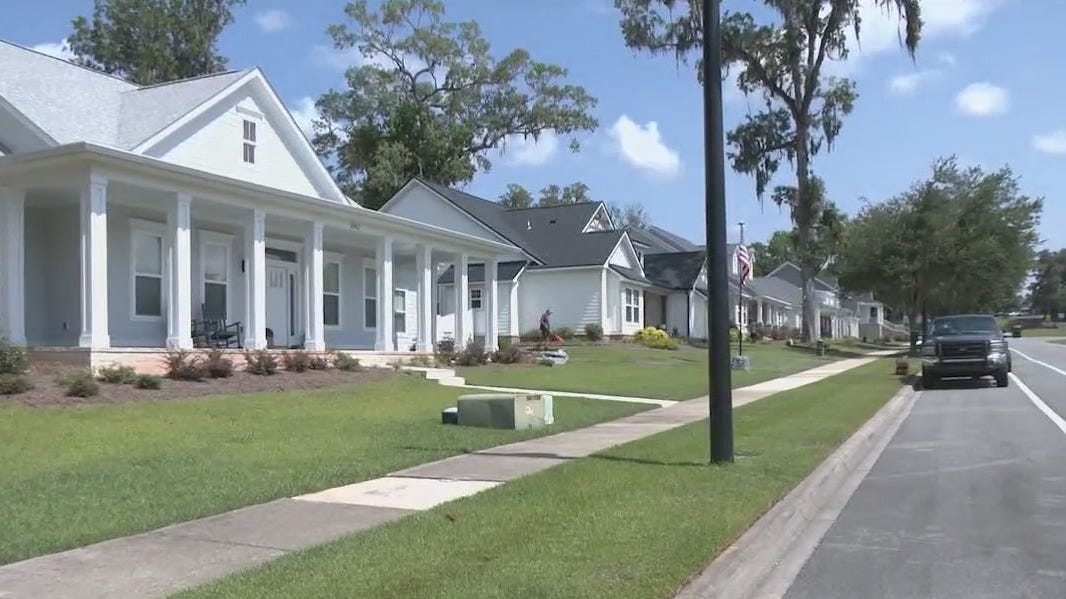
Florida lawmakers debate property tax
A House panel began a review of property taxes as it examines potential changes that could have a significant impact on local governments.
Fox – 35 Orlando
- The Florida Legislature is considering eight bills aimed at reducing or eliminating property taxes.
- Critics argue that cutting property taxes would lead to a loss of essential community services and erode local government authority.
- Property taxes are local fees based on a property’s assessed value that fund services like police, fire departments, and parks.
The Florida Legislature is taking aim at property taxes with an eye toward reducing or eliminating some of them altogether.
The eight bills under discussion all seek to slash property taxes in slightly different ways but they all exempt the portion of the property tax that goes to K-12 school funding. They also specifically ban local governments from cutting law enforcement spending even though state law already bars cities and counties from cutting police funding without state approval.
Gov. Ron DeSantis, who has repeatedly called for the abolishment of property taxes altogether, at least for those with homestead exemptions, complained that the multiple bills are just political theater.
“It’s a political game, not a serious attempt to get it done for the people,” he posted to X on Oct. 22.
Critics have pointed out that reductions in property tax would force cuts in valuable community services.
The move would also be another way to further erode the authority and power of local governments, or home rule, which has been a recurrent theme in many of the measures from DeSantis and Florida’s Republican legislators. During his time in office DeSantis has overseen limitations on local emergency powers, prohibitions against investing taxpayer funds using environmental, social and governance guidelines, elimination of local government’s ability to challenge land-use or zoning decisions, and more.
In September, 23 cities and two counties sued to overturn a new law that prohibits local governments from enacting stricter planning requirements.
What are property taxes?
Property taxes are fees you pay based on your property’s assessed value, which is a percentage of what your property is worth. The more your property is worth, the higher your property tax bill will be.
Unlike income tax, which goes to the federal and state government, property taxes go to your city’s or county’s or school district’s general fund and cover a large amount of the community’s budget, often most of it.
If you have a mortgage, your property taxes are generally included in your payments. If not, you will be billed by the county every year if you have not opted for quarterly payments.
What do my property taxes pay for in Florida?
Property taxes go toward essential local services that don’t pay for themselves or have offsetting revenues, such as:
- Police and fire departments
- 911 dispatchers
- Emergency management
- Road maintenance
- Schools
- Parks and recreation
- Libraries
- Public health services
- Local government
How are property taxes calculated in Florida?
Your property tax is calculated with a three-step process:
- The county property appraises determines an assessment value of your home
- The millage rate is applied
- Any eligible exemptions are subtracted
The result is what you pay. Due to differences in rates and eligible exemptions, everyone’s property taxes may be different, even on the same street.
What is the millage rate?
Annual tax rates, called millage rates, are set by the local taxing authorities who will be getting a portion of the revenue.
A millage rate is the amount of tax per every $1,000 of the assessed value of your home. A millage rate of 10 would mean the property owner would pay $10 in tax for every $1,000 of their taxable property value.
The assessed value of your home, determined by the county property appraiser, is generally lower than the market value.
What property tax exemptions are available?
Florida has a variety of property tax exemptions available, most notably the homestead exemption which decreases the property’s taxable value by as much as $50,000.
If you receive a homestead exemption, you are also qualified for the Save Our Homes assessment limitation, which by state law caps the amount your property taxes can rise per year to no more than 3% regardless of any changes in property values. Save Our Homes was approved by Florida voters in 1992 to protect residents, especially those on fixed incomes, from being taxed out of their homes as property values rose.
There are several other exemptions available for active duty military or veterans, people 65 and older, and more.
Who gets money from property taxes?
Different property taxes are set by a variety of local agencies including:
- Your county government
- Your city government, if you live in an incorporated area
- Your local school district
- Your local water management district
- Other special districts
Tax rates are determined based on budgetary projections and must undergo public hearings and state oversight. Taxes also may be raised to cover local government funding shortfalls or to help pay for projects.
Homeowners receive a Truth in Millage (TRIM) notice from their county every year, alerting them to how millage rates were calculated and what their proposed rates will be the next year.
What happens if Florida reduces or eliminates property taxes?
You get to keep more of your money.
However, your community and your standard of living may suffer when local governments are forced to cut back.
The Florida Policy Institute, an Orlando-based organization, analyzed preliminary data from the Department of Revenue and estimated that dropping the property taxes on homesteaded properties would result in counties and school districts losing about $7.8 billion each and cities having to replace some $3 billion.
The Tallahassee-based Florida TaxWatch made a similar projection based on last year’s local taxes.
How does Florida’s property tax rate compare to the US?
Florida’s effective tax rate in 2024 was 0.91%, according to Business Insider, which was under the national average of 1.02%. The highest rate was 2.23%, in New Jersey.
More than 80% of Florida’s counties have kept their millage rates the same or even lowered them since 2019, according to the Florida Association of Counties advocacy group, based on Florida Department of Revenue data.
What property tax bills are the Florida House debating?
Eight bills have been filed in the House to reduce or eliminate property taxes so far:
- HB 215: Would require property tax rate proposals to win a two-thirds vote
- HB 201: Would eliminate all property taxes aside from school district levies for anyone with homestead exemptions and prevent local governments from reducing funding for law enforcement to make up the loss, starting Jan. 1, 2027.
- HB 203: Similar to HB 201, but would phase out non-school property taxes for homestead properties over 10 years by increasing the assessed property value exemption by $100,000 each year
- HB 205: Would eliminate non-school property taxes for residents with a homestead exemption if they are over 65
- HB 207: Would increase the current homestead exemption for non-school taxes to 25% of the assessed value of the home
- HB 209: Would increase homestead exemption by $100,000 for homesteaders who also have property insurance
- HB 211: Would eliminate the $500,000 cap on transferring the homestead exemption from one property to another
- HB 213: Would lower the 3% cap on the annual growth in assessed value for homestead properties and 10% cap on non-homestead properties to 3% over three years for homestead properties and 15% over three years for non-homestead properties
What happens if the property tax bills are approved?
Proposed property tax changes must be approved by Florida voters.
First, each one would need to get 60% of the votes in both the state House and Senate to get on the ballot., Then, 60% of the voters would need to approve in in the statewide election.

